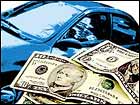
How time flies. You thought your teen-ager's sixteenth birthday would never come. And now, as if it's not enough that she's embarrassed to be seen with you in public, she wants the keys to your car.
Besides worrying about her safety, you'll also have to give thought to your auto insurance bills. Statistics show that teen drivers are involved in more than their share of accidents. Insurers charge accordingly.
"Parents who add either a teen-age son or daughter to their insurance can expect an increase of 50 to 100 percent in insurance costs," said Jeanne Salvatore, vice president of consumer affairs at the Insurance Information Institute.
Although insuring a teen-age driver is inevitably expensive, there are some things you can do to keep costs down. Here are five tips that will help minimize the financial impact.
Urge your teen to drive safely. "To keep insurance costs down, the key rule is to stay accident-free," said Dave Hurst, a spokesperson for State Farm Insurance. Teens cost a lot to insure because, as a group, they get into a lot of accidents. Once your child actually has an accident on his record, watch out.
If you live in one of the 34 states that now requires graduated licensing, you're in luck: These programs, which became popular during the last five years, have increased safety for teens behind the wheel, said Russ Rader, a spokesperson for the Insurance Institute for Highway Safety.
With a graduated licensing program, a teen-ager does not receive full driving privileges immediately. For example, they may have to drive only under parental supervision for a while. There may be other restrictions as well, such as not being allowed to drive at night or carry other teens as passengers.
Even if you don't live in a state with graduated licensing, supervise your teen's driving anyway. Talk to them about the importance of staying sober behind the wheel, and set a good example by driving safely yourself.
Before you buy your teen a car, check its insurance cost. Some cars cost more to insure than others because they are more expensive to repair or replace. Also, like some drivers, some cars are riskier than others. They tend to get involved in accidents or get stolen more often than other cars. Since premiums can vary widely, even among cars in the same price range, it pays to check insurance rates before you buy the car.
List your teenager as an "occasional driver" of your car. "A key thing is that you want to have the child listed as an occasional driver rather than the principal driver of the vehicle," said Hurst.
The idea of getting your kid his or her own car is not good from an insurance standpoint. Better to list your son or daughter as a driver of your car. You can list someone as a principal or an occasional driver: According to State Farm's definition, an occasional driver is someone unmarried and under 21 who drives the car less than 25 percent of the time, or puts on less than 25 percent of the mileage. A principal driver uses the vehicle 50 percent or more of the time. The insurance premium for a principal driver will be considerably higher.
If your teen-ager lives away at school (and away from the car), be sure to mention this to your insurer. They may offer you a pro-rated price, based on the amount of time your son or daughter spends at home.
If your child has good grades or has taken driver's education, ask for a discount. If your teen has a B average or better, some companies offer an insurance discount, said Michael Trevino, a spokesperson for Allstate Insurance Co. Insurance companies aren't just trying to support educational excellence. They point to studies showing that students who study hard also drive more carefully.
"You generally have to be a full-time student with a B average or better," said Hurst. "But the discount can decrease your insurance premium by up to 25 percent."
And ask for a discount if your kid has taken driver's education. Some states require that companies offer a driver training discount, generally about 10 percent of premium costs.
Increase your deductible and consider cutting out comprehensive and collision. If you can afford it, get a higher deductible -- that's the amount that you agree to pay in the event of a loss -- will lower your insurance premium costs. That's usually true for any driver, not just teens.
Depending on the value of your car, it might not make sense to get comprehensive and collision insurance. These types of insurance pay for damage to your (or your insured teen's) car, but not other drivers or their cars. You may end up paying more in premiums than the car itself is worth.

|

